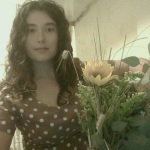Musings from Students of the Pardes Institute of Jewish Studies in Jerusalem
Posted on September 22, 2014 by Sarah Marx
 In the last week, hovering on the edge of Rosh Hashanah, I’ve heard and sung songs that shook me to my core. In the coming weeks, I’ll be faced with many more – liturgy for the High Holidays, its passion and fear barely contained by the melodies’ majesty, or zemirot sung around the Shabbat table. I’ll chant my personal prayers through tears, and I’ll hum those same motifs into my hairbrush in the shower. We’re about to enter one of the richest periods in a tradition already rich with music. It feels appropriate, then, that this week’s portion should be Ha’azinu: Moses’s story-song, entrusted to the people of Israel immediately before he dies.
In the last week, hovering on the edge of Rosh Hashanah, I’ve heard and sung songs that shook me to my core. In the coming weeks, I’ll be faced with many more – liturgy for the High Holidays, its passion and fear barely contained by the melodies’ majesty, or zemirot sung around the Shabbat table. I’ll chant my personal prayers through tears, and I’ll hum those same motifs into my hairbrush in the shower. We’re about to enter one of the richest periods in a tradition already rich with music. It feels appropriate, then, that this week’s portion should be Ha’azinu: Moses’s story-song, entrusted to the people of Israel immediately before he dies.
Like so much of Jewish liturgy, the song in Ha’azinu both exults and mourns; it weaves the remembered past into words, casts new light on the present, and dreams in wild metaphors about the future. Technically, its intended audience is the Jewish people, both those listening at Moses’s feet and those chanting the same words from Torah now: “And when Moses finished reciting all these words to all Israel, he said to them: Take to heart all the words with which I have warned you this day…” (D’varim 32:45-46).* Yet although the people of Israel are asked to take the words to their heart and teach them to their children, the song itself seems to be addressed to all of creation. It opens by crying out to the natural world, asking the heavens and the earth to give ear. It calls to the Jewish nation and to God, but it also invokes all the men and women of the world in its final lines: “O nations, acclaim His people!” (32:43) The song bears witness specifically to the Jewish saga, as seen and foreseen by Moses. Still, it maintains its universality. This may not explicitly be a story about the nations, or about the creatures and elements of the natural world, but it is confident that it has something to offer them. The story is particular – our story, meant for us to memorize and pass on to our children – and it is universal. All art, I think, shares this tension: it’s built on the artist’s specific desires and dreams and associations, but if it’s going to have any power it has to go beyond those specifics.
Nowhere is this more evident for me than in Jewish music – whether niggunim, like “Kah Echsof” (which we’ve been learning in Chasidut class and which shakes me to my bones), or moments in a prayer service. So often, Jewish prayers and tunes are written in the first-person plural, making observations or praises or requests that could apply to anyone singing or hearing. The music is so, so beautiful, and it will worm itself into your heart until it has some – any – effect on you. And yet the experience of listening and davening and singing is almost unbearably personal. On Rosh Hashanah and Yom Kippur, days of universalized communal prayer, I feel as though I myself have wrung my soul out and opened myself up for judgment. Hearing “Kah Echsof” in Chasidut, surrounded by at least twenty other people, I saw the song play across our faces in ways unique to each individual. We’re all so different, and yet we’re all unified in the experience of hearing and feeling.
Over the upcoming Days of Awe, I hope I can meet the challenge set by Ha’azinu: to allow music and prayer to affect me deeply – me, with my own concerns and history – and still to recognize it as belonging to everyone. Moses’s final words in the weekly portion are these: “For this [the words that the people have just heard] is not a trifling thing for you: it is your very life; through it you shall long endure on the land that you are to possess upon crossing the Jordan” (32:47). My life is both personal and communal. Without myself, or without the world around me, I would be unable to live. And so I’m thankful for art, for the songs of Ha’azinu and the High Holidays and the rest of the world, because it makes me aware both of myself and of the world I share with others.